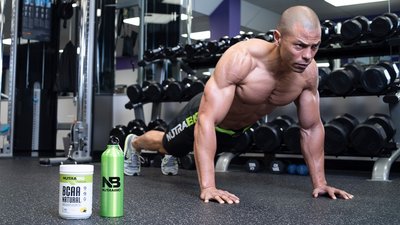"I first became aware of performance-enhancing drugs when I was accused of taking them," recalls IFBB bikini pro Amanda Aguzzi. "I had friends and family ask me or assume I was taking something. Admittedly, this upset me—all of my hard work was finally showing, and people were denouncing it."
In reality, the New York native had changed her routine drastically, rebuilding it around fitness while attending The University of Vermont.
"I went from living the typical college life to prioritizing the gym and planning my life around it," says the 27-year-old. "I quickly realized the important connection between diet and training. For the first time in my 10 years of being a vegetarian, I got an adequate amount of protein in. The gains came fast."
Aguzzi made the choice to remain a natural athlete, even when she committed to entering a bikini competition in 2016. She found herself up against other athletes who were using performance-enhancing drugs (PDEs), but the temptation just wasn't there.
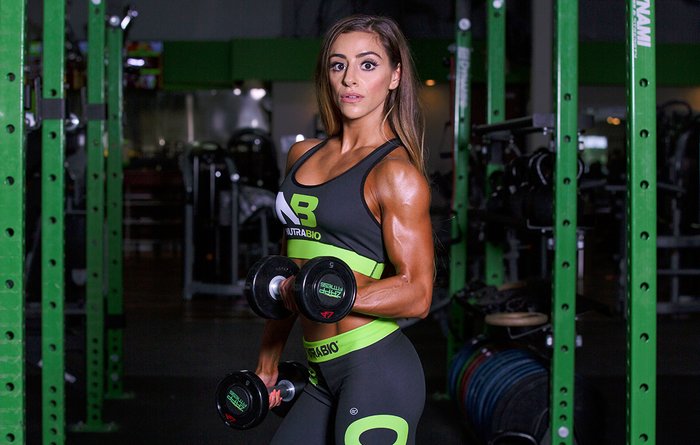
"My main goal was always to feel happier and healthier—I'm a strong believer in movement for happiness," explains the 5-foot, 100-pounder, who works as an online health-and-fitness coach. "When we feel good, we look good, too. Because my focus was on my contentment, taking drugs was never on my radar."
Coming to this crossroads—to use performance-enhancing drugs or to remain natural—isn't unique to Aguzzi's situation, of course. Everyone who discovers the thrills and rewards of weight training and bodybuilding, both intrinsic and extrinsic, will likely face the same decision. To use, or not to use?
In addition to Aguzzi, we spoke with two other NutraBio brand ambassadors—IFBB men's physique pro Tim Santiago and athlete and acupuncturist Amanda Occhipinti—about their views on what it means to be a natural athlete in the world of physique competition.
Naturally Competitive
Tim Santiago remembers the moment he realized he wanted to be a bodybuilder. It was during the 2010 Olympia Weekend in Las Vegas.
"Seeing all the world-class athletes onstage inspired me to take my physique to the next level," he says. "I got home from the show and I started training for my first competition."
Santiago had played organized soccer from grade school into college, which included weight training for performance, so he didn't have to start from scratch in the gym. Instead, he simply tweaked his old workouts to maximize muscle growth.
"I first heard about performance-enhancing drugs in college," Santiago recalls. "There were a lot of guys at the gym who would talk about using them. Then, when I got into bodybuilding and competing, steroids were very commonly discussed and used."
Santiago stayed true to the course he'd followed from a young age. He had been a natural athlete his entire life at 6 feet tall and 195 pounds, and a lot of factors went into that decision. Perhaps the biggest was his health.
Steroids have numerous side effects, and different types of drugs have different risks. Studies have shown that using anabolic steroids increases the risk of potentially fatal conditions, including heart attack and heart rhythm problems. Some can raise blood pressure and "bad" cholesterol while lowering "good" cholesterol, contributing to long-term heart disease.
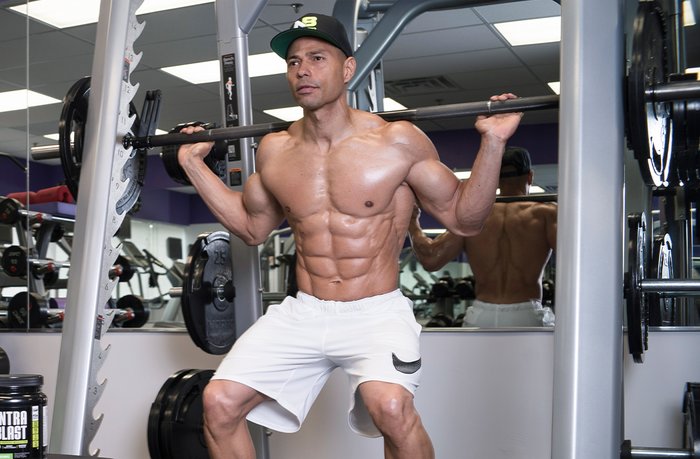
"Being a dad in my 40s, I was not willing to risk destroying my good health for the sake of growing bigger and stronger faster when I can grow bigger and stronger naturally," he explains.
The decision may have cost him some placings and titles here and there, but he's proven that there's also plenty of success to be had on the pro level without using PEDs.
"I have had so many memorable competitions in my career," says Santiago, who owns Athleta Fitness Studio in Freehold, New Jersey. "One was the year I turned 40, in 2014, at the NPC Team Universe. I won the Men's Physique Over-40 Overall title and earned my pro card. Another was the 2017 Puerto Rico Pro, where I won the Master's Men's Physique title. I was born and raised in Puerto Rico, so I was incredibly grateful to be able to go home and win with my mom, my dad, and my family all there to watch and cheer me on."
Without PEDs to aid growth and recovery, Santiago has to focus on every detail of his training and dieting. To lose body fat while preserving as much lean mass as possible, he likes to give himself plenty of time to prep for competitions—usually 16-18 weeks.
"Any time you prep naturally, there will be some degree of muscle loss. By giving myself a longer preparation period, I can take my time, gradually decreasing calories and increasing my cardio," he says.
Santiago also strives to keep intensity high during workouts. This allows him to maintain as much muscle as possible. With steroids, it's much easier to maintain muscle while leaning out. Posing becomes that much more critical.
"If the other guys come in bigger, I can still outshine with my stage presence," Santiago says. "Bodybuilding isn't only about who is the biggest and most shredded up there; it's a complete package of how you look and how you present yourself."

Living Her Best Life
Standing at 5-foot-2, Amanda Occhipinti knew she needed a leg up when it came to the rough-and-tumble lacrosse field. Her shortcomings (pun intended) inspired her to pick up cross-training in high school, so she started working out with weights and doing functional exercises to up her game.
"It was important to me to be able to run the field and be agile," Occhipinti recalls. "I wanted to have the fastest mile times and be competitive in other ways despite being the goalkeeper."
Unfortunately, by the time she reached Drew University in Madison, New Jersey, her lacrosse ambitions—and her physical fitness pursuits—came to a stop.
"I was recruited to play lacrosse in college, but when I got there, I had a hard time with the transition and battled with mental health issues. I became severely anorexic and eventually had to terminate my lacrosse career," she says.
Fast-forward one year, and Occhipinti, who had tackled her struggles head-on without traditional treatment, discovered bikini competition. She says she was fascinated by the sport and amazed by the idea that competitors ate all the food that they did while being fit and lean.
"I wanted in," she says.
She directed her latent competitive fire toward the weights, and it fueled positive changes mentally and physically. It redirected her thoughts away from fearing food to learning how to nourish her body to build and sustain muscle mass. When she started to prepare for competition, however, the inevitable temptations popped up.
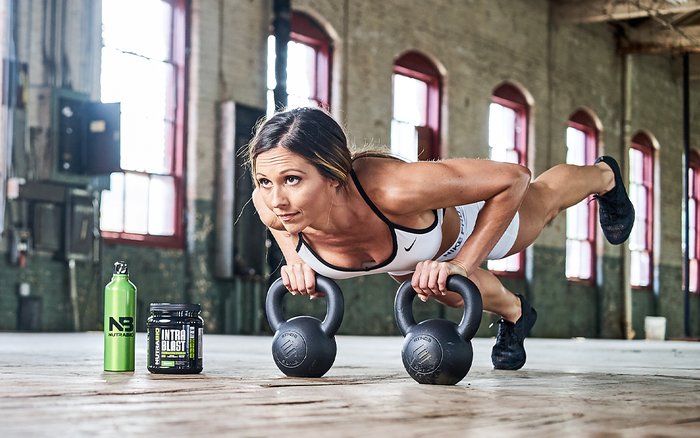
"I was familiar with men using PEDs, especially bodybuilders, but it wasn't until I was interning for a sports supplement company that I realized they were also used by bikini and figure competitors," she remembers. Six weeks out from her first show in 2011, someone she worked with asked her if she wanted to take PEDs because "all the women do it," and it's what "keeps you hard and gets you really lean."
"Before this offer," Occhipinti says, "I really thought that maybe I wasn't working and dieting hard enough, and that genetically I wasn't as gifted as other competitors. I assumed that's why I wasn't getting to a sub-10 body-fat percentage."
After respectfully declining the offer, she went on to finish second in her class at the 2011 East Coast Championships. Later on, in 2015, she decided three weeks out to compete at the OCB Bikini Charm City Classic in Maryland.
"I was able to do that because I maintained the bodybuilding competition lifestyle all year long," Occhipinti says. "I had few expectations, going into it with an open heart, and wanted to have fun."
She did more than that, however, taking her class in the novice and open divisions and going on to win the novice overall while finishing runner-up among all the open class champs.
"I achieved what I set out to achieve, without compromise," she says of her feat.
Now 30, Occhipinti has put competing on hold as she builds her business as a doctor of acupuncture in Berkeley Heights, New Jersey. She believes that initial decision to remain natural has had a positive impact on every area of her life.
"I'm most proud of being able to create a sustainable lifestyle beyond competing, which I attribute to being a natural athlete," she says. "Staying natural allows me to not succumb to an offseason weight. I can maintain a healthy, well-balanced lifestyle all year and then turn it up a notch once I enter competition season without creating excess damage."
Success without Shortcuts
While all three athletes took different roads to their ultimate decision to remain natural, they all agree on one thing: It's an individual choice everyone has to make. The key, though, is to clear out the pressures and distracting messages that regularly bombard those who are plugged into the fitness and bodybuilding realm.
"The rise of steroids is because bodybuilding and sports are inherently competitive," Santiago says. "If an athlete is not competing with someone else, they're competing with who they were yesterday, striving to do better, to be better. And the pressure to improve is not just internal. It also comes from coaches, parents, and even fans."
While social media has been a boon to the industry, bringing like-minded fitness fans closer together and giving direct access to the world's best athletes, it has also been damaging, setting unrealistic expectations while also fueling a faster race to improve.
"I think pressure comes from social media—seeing these top-level bodybuilders getting big, shredded, and vascular so quickly causes athletes to seek more sophisticated ways to outperform the competition," Santiago points out. "Unfortunately, there's a lot of use, misuse, and abuse when it comes to bodybuilding drugs."
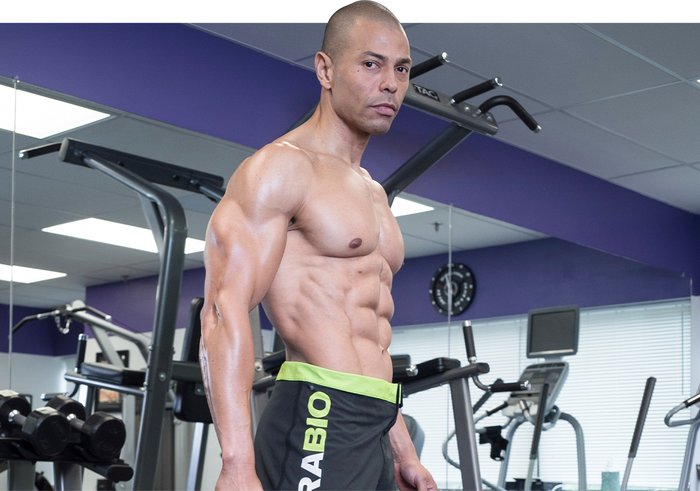
Occhipinti tells people who are feeling that pressure to step back and remember the bigger picture.
"Competing is just one chapter in your book of life," she points out. "If you stay consistent and focused throughout the year, you can keep your body in a place where just making a few changes can have a big impact."
Finally, before you fall into the common mental trap that drugs are "your only choice" to be competitive and achieve the body you want, reassess everything you're doing, Aguzzi advises.
"Temptation and pressure are everywhere, but it's important to do your own research and know the facts," she says. "Are there areas in your training or diet where you're cutting corners? Is there another method you can try to switch things up? If not, look again. I believe there's always room for improvement."
The second-year IFBB Bikini pro—who finished in the top 10 at the 2019 Puerto Rico Pro—even suggests that taking drugs may not be the shortcut you expect it to be.
"Hard work pays off, period," Aguzzi insists. "For me, using drugs seems to be the more difficult path in the long run. Make sure to ask yourself if the short-term benefits outweigh the long-term effects, mentally and physically."




